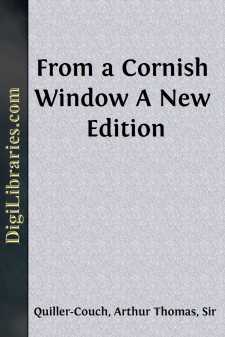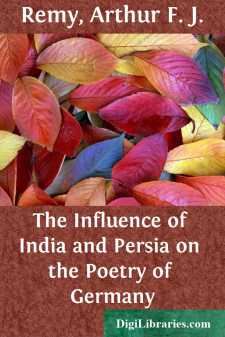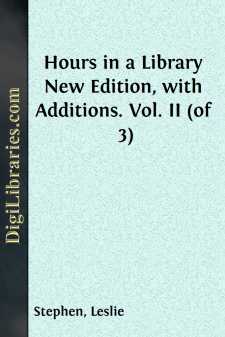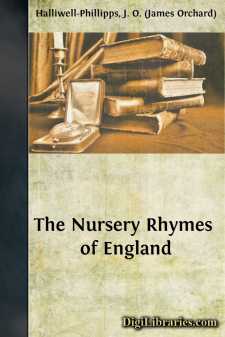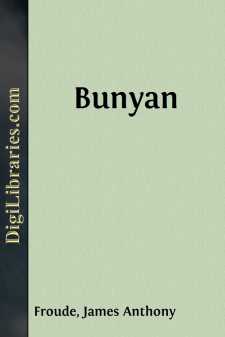Literary Criticism
- American 18
- Ancient and Classical 3
- Asian 1
- Australian & Oceanian 1
- Books & Reading 8
- Caribbean & Latin American 2
- Drama 2
- English, Irish, Scottish, Welsh 49
- European 7
- General 37
- Horror 1
- Humor 2
- Jewish 2
- Medieval 2
- Middle Eastern 3
- Poetry 7
- Renaissance 6
- Russian & Former Soviet Union 1
- Shakespeare 27
Literary Criticism Books
Sort by:
DEDICATION. MY DEAR WILLIAM ARCHER, Severe and ruthlessly honest man that you are, you will find that the levities and the gravities of this book do not accord, and will say so. I plead only that they were written at intervals, and in part for recreation, during years in which their author has striven to maintain a cheerful mind while a popular philosophy which he believed to be cheap took possession...
more...
PREFACE What I aim at in this book is little more than to give complete reflection to those great figures in Literature which have so long obsessed me. This poor reflection of them passes, as they pass, image by image, eidolon by eidolon, in the flowing stream of my own consciousness. Most books of critical essays take upon themselves, in unpardonable effrontery, to weigh and judge, from their own...
more...
CHAPTER I. INTRODUCTION. Information of Mediæval Europe Concerning India and Persia—Travellers—India and Persia in Mediæval German Poetry. The knowledge which mediæval Europe had of India and Persia was mostly indirect, and, as might be expected, deficient both in correctness and extent, resting, as it did, on the statements of classical and patristic writers, on hearsay and on oral...
more...
by:
Leslie Stephen
A book appeared not long ago of which it was the professed object to give to the modern generation of lazy readers the pith of Boswell's immortal biography. I shall, for sufficient reasons, refrain from discussing the merits of the performance. One remark, indeed, may be made in passing. The circle of readers to whom such a book is welcome must, of necessity, be limited. To the true lovers of...
more...
I. LD King Cole Was a merry old soul, And a merry old soul was he; He called for his pipe, And he called for his bowl, And he called for his fiddlers three. Every fiddler, he had a fiddle, And a very fine fiddle had he; Twee tweedle dee, tweedle dee, went the fiddlers. Oh, there's none so rare, As can compare With King Cole and his fiddlers three! [The traditional Nursery Rhymes of England...
more...
by:
Israel Abrahams
CHAPTER I THE "VINEYARD" AT JAMNIA Schools at Jamnia, Lydda, Usha, and Sepphoris.—The Tannaim compile the Mishnah.—Jochanan, Akiba, Meir, Judah.—Aquila. The story of Jewish literature, after the destruction of the Temple at Jerusalem in the year 70 of the Christian era, centres round the city of Jamnia. Jamnia, or Jabneh, lay near the sea, beautifully situated on the slopes of a gentle...
more...
by:
Jesse Johnson
INTRODUCTORY The Shakespearean Sonnets are not a single or connected work like an ordinary play or poem. Their composition apparently extended over a considerable time, which may be fairly estimated as not less than four years. Read literally they seem to portray thoughts, modes or experiences fairly assignable to such a period. Though variable and sometimes light and airy in their movement, the...
more...
EARLY LIFE. 'I was of a low and inconsiderable generation, my father's house being of that rank that is meanest and most despised of all families in the land.' 'I never went to school, to Aristotle or Plato, but was brought up in my father's house in a very mean condition, among a company of poor countrymen.' 'Nevertheless, I bless God that by this door He brought me...
more...
by:
Lady Gregory
RAFTERY I. One winter afternoon as I sat by the fire in a ward of Gort Workhouse, I listened to two old women arguing about the merits of two rival poets they had seen and heard in their childhood. One old woman, who was from Kilchreest, said: 'Raftery hadn't a stim of sight; and he travelled the whole nation; and he was the best poet that ever was, and the best fiddler. It was always at my...
more...
by:
Henry Coppee
Chapter I. The Historical Scope of the Subject. . . . . . . . . . Literature and Science. There are two words in the English language which are now used to express the two great divisions of mental production—Science and Literature; and yet, from their etymology, they have so much in common, that it has been necessary to attach to each a technical meaning, in order that we may employ them without...
more...


